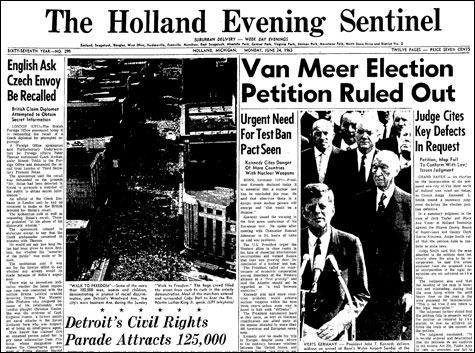
Click the image to read the Holland Evening Sentinel's account of Detroit's civil-rights demonstration from June 1963. |
On Sunday, June 23, 1963, 125,000 people marched down Detroit's Woodward Avenue to the Civic Center, in what was described at the time as the largest civil-rights demonstration in the nation's history. According to the next day's account in the Holland Evening Sentinel, the crowd at the Center "lustily booed," when representatives of Governor George W. Romney read a proclamation declaring "Freedom March Day in Michigan."But Martin Luther King Jr. didn't fault Romney for his absence, which the governor ascribed to his policy against public appearances on the Sabbath. "At a news conference following the march . . . [King] refused to criticize Romney for not attending the demonstration," the Sentinel reported.
"Issuing the proclamation, and sending his personal representatives, was probably more than 49 other governors would have been willing to do at that time," says Clayborne Carson, director of the Martin Luther King Jr. Papers Project at Stanford University. "It took considerable courage."
Romney would go much further, participating in a small demonstration in Grosse Pointe later that week; refusing to endorse Barry Goldwater in 1964, largely because of Goldwater's vote against the Civil Rights Act; and, in 1965, marching in Detroit to protest the police actions in Selma, Alabama.
These acts placed him at odds with his political party and with his church leadership. They are the types of actions, in defense of principles and at the risk of ambitions, that appear to be lacking in Romney's son — a failing that leads him, repeatedly, into false or exaggerated claims such as the one that has him in trouble this week.
Mitt Romney never questioned or decried the Mormon Church's doctrine forbidding black priests, which continued until 1978, at which time Romney was 31 years old, a vice president at Bain & Company, and the father of four.
So, for evidence of a principled stand he never took, Romney appropriated his father's principles. But, unlike King himself, Romney was not satisfied with what George Romney actually did. He inflated it, placing his father into the iconic position of marching alongside the civil rights leader.
He didn't just use imprecise language, as his campaign is now spinning it. His language — in at least three different nationally televised instances, including this past Sunday's Meet the Press with Tim Russert — was precise enough: he had direct, personal first-hand knowledge that his father had marched with Dr. King.
The precision, in fact, is the problem: the sincerity with which he offered the memory, the emotion that led his eyes to well up. This was not a man simply passing along something he had once come across in a David Broder book.
And yesterday, after being called on the issue, he offered more specifics. He told reporters in Iowa that he recalled his father changing his mind, and deciding to march even though it was Sunday.